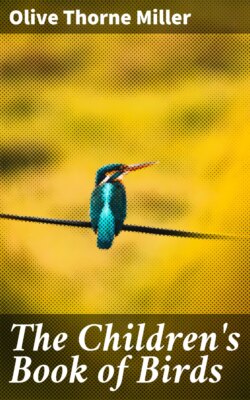Читать книгу The Children's Book of Birds - Olive Thorne Miller - Страница 11
На сайте Литреса книга снята с продажи.
IV
ОглавлениеTable of Contents
THE BABY BIRD
A baby bird, as you know, always comes out of an egg. And beautiful as these eggs are, they are most interesting when you think that each one holds a tiny bird.
Eggs are not all alike, of course. One the size of a bean is large enough to hold a hummingbird baby, till it is old enough to come out. But the young ostrich needs a shell nearly as big as your head. So there are all sizes of eggs to fit the different sizes of birds.
If you should break a fresh egg you would not see a bird, for it would not be formed at that time. After the egg is laid in its soft bed, it has to be kept warm for many days, and that is why the mother bird sits on her nest so quietly. She is keeping the eggs warm, so that the little ones will form and grow, till they are as big as the shells can hold.
While the mother is sitting her mate does all he can to help, though each species has its own way. The blue jay brings food to his mate, so that she need not leave the nest at all, and many others do so. But the kingbird father simply watches the nest to protect it while the mother goes for food. A redstart gets into the nest himself, to keep the eggs warm while his mate is gone, and a goldfinch coaxes his mate to go off with him for a lunch, leaving nest and eggs to take care of themselves.
REDSTARTS (FEMALE ON NEST)
Another thing the father birds do is to sing. This is the time when we hear so much bird song. The singers have little to do but to wait, and so they please themselves, and their mates, and us too, by singing a great deal.
When the little birds begin to be cramped, and find their cradle too tight, they peck at the shell with a sort of tooth that grows on the end of the beak, and is called the "egg tooth." This soon breaks the shell, and they come out. Then the mother or father carefully picks up the pieces of shell, carries them off, and throws them away, leaving only the little ones in the nest. Perhaps you have found these broken shells on the ground sometimes, and could not guess how they came there. When the birdlings break out of their prison they do not all look the same. Ducks and geese and chickens and quails, and other birds who live on the ground, as well as hawks and owls, are dressed in pretty suits of down. They have their eyes open, and the ground birds are ready to run about at once.
A man who studied birds, once saw a young duck get its first suit of down. He picked up the egg just as the little bird inside was trying to get out. In a few minutes the shell fell apart, and out stepped the duckling on his hand. It seemed to be covered with coarse black hairs, which in a moment began to burst open, one by one, and out of each came a soft fluff of down. So in a few minutes, while the man stood there and held him, the little duck was all covered with his pretty dress.
But most birds hatched in nests in trees and bushes, like robins and bluebirds, are very different. When they come out of their shells they are naked, have their eyes shut, and look as if they were nearly all mouth. A young hummingbird looks about as big as a honey bee, and a robin baby not much bigger than the eggshell he came out of.
They lie flat down in the nest, seeming to be asleep most of the time. All they want is to be warm and to be fed.
To keep them warm, the mother sits on them a great part of the time, and for the first few days of their lives, the father often brings most of the food. Sometimes he gives it to the mother, and she feeds the little ones. But sometimes she gets off the nest, and flies away to rest, and get something to eat for herself, while he feeds the nestlings.
There is one bird father who—it is thought—never comes to the nest, either to watch the eggs or to help feed the nestlings. That is our hummingbird, the ruby throat.
We do not know the reason for this, and it is not fair to say hard things about him until we do. It may be that he thinks his shining ruby would show the hiding-place of the nest, or it may be that the little mother is not willing to have any help. I think this last is the real reason, for she has a great deal of spirit, and always drives away others from her feeding-places.
Young birds grow very fast, and soon feathers begin to come out all over them. They are not very pretty at this time.
